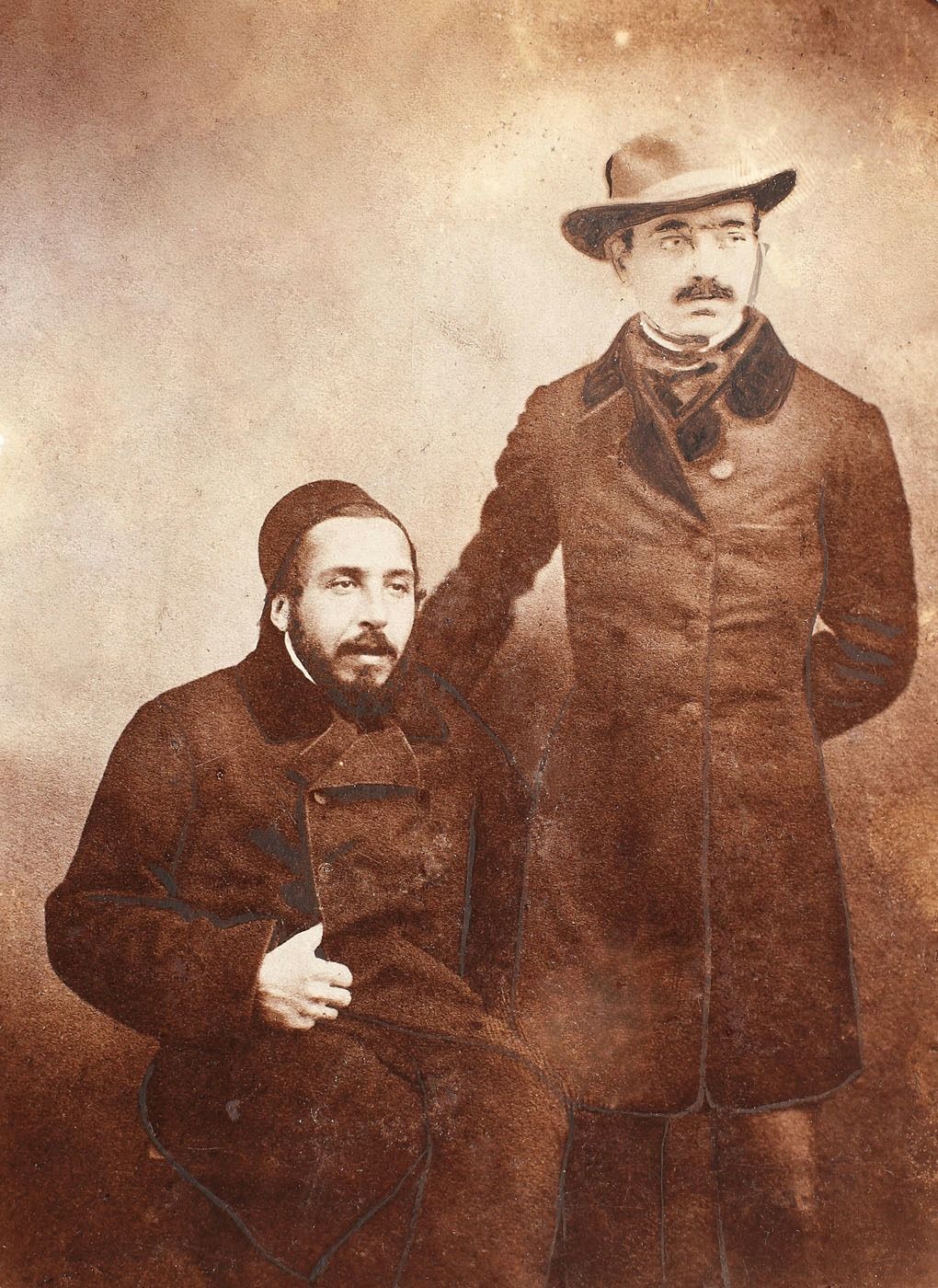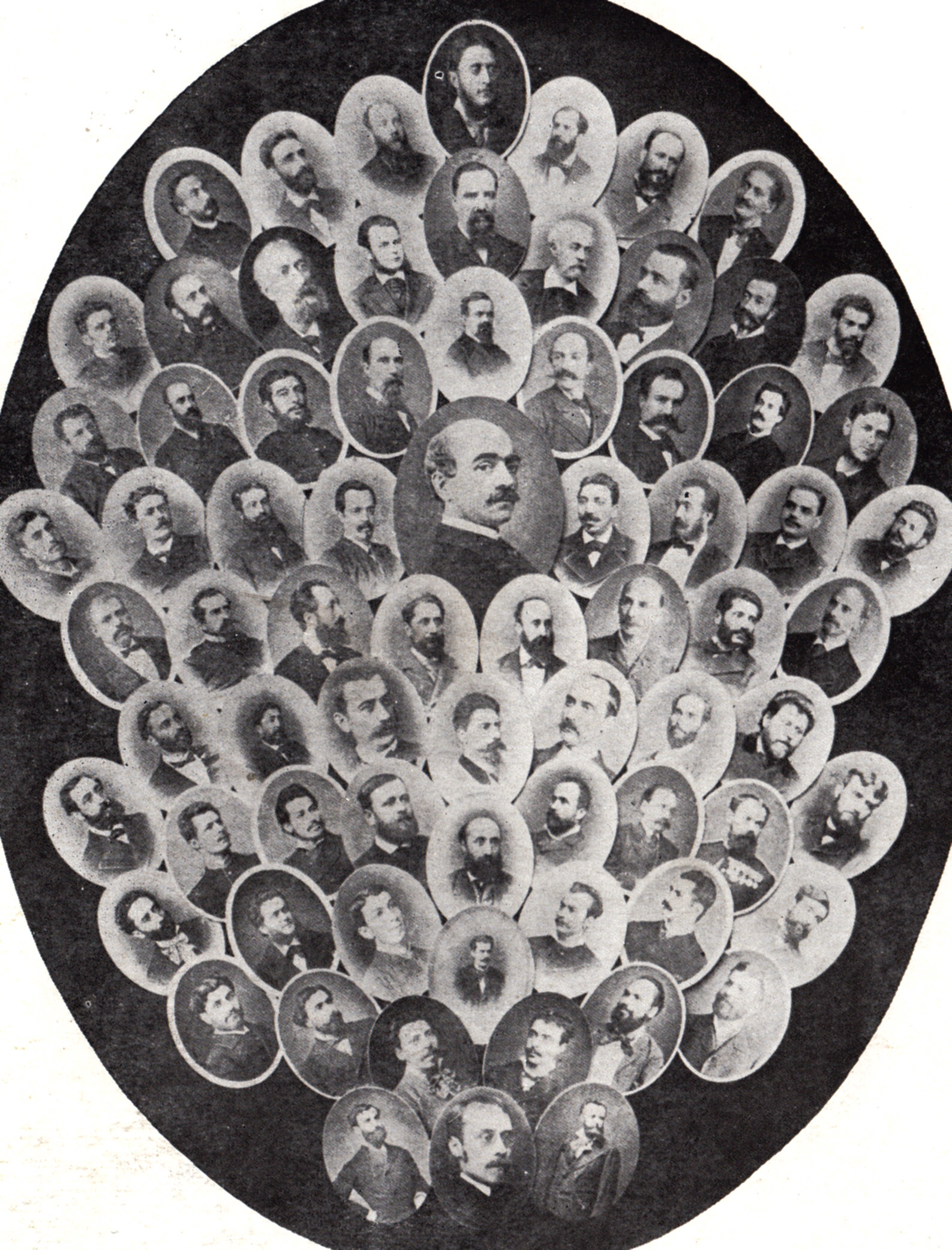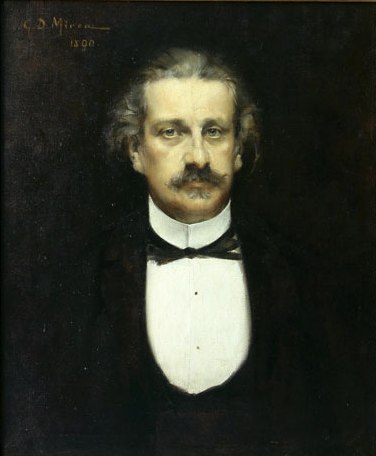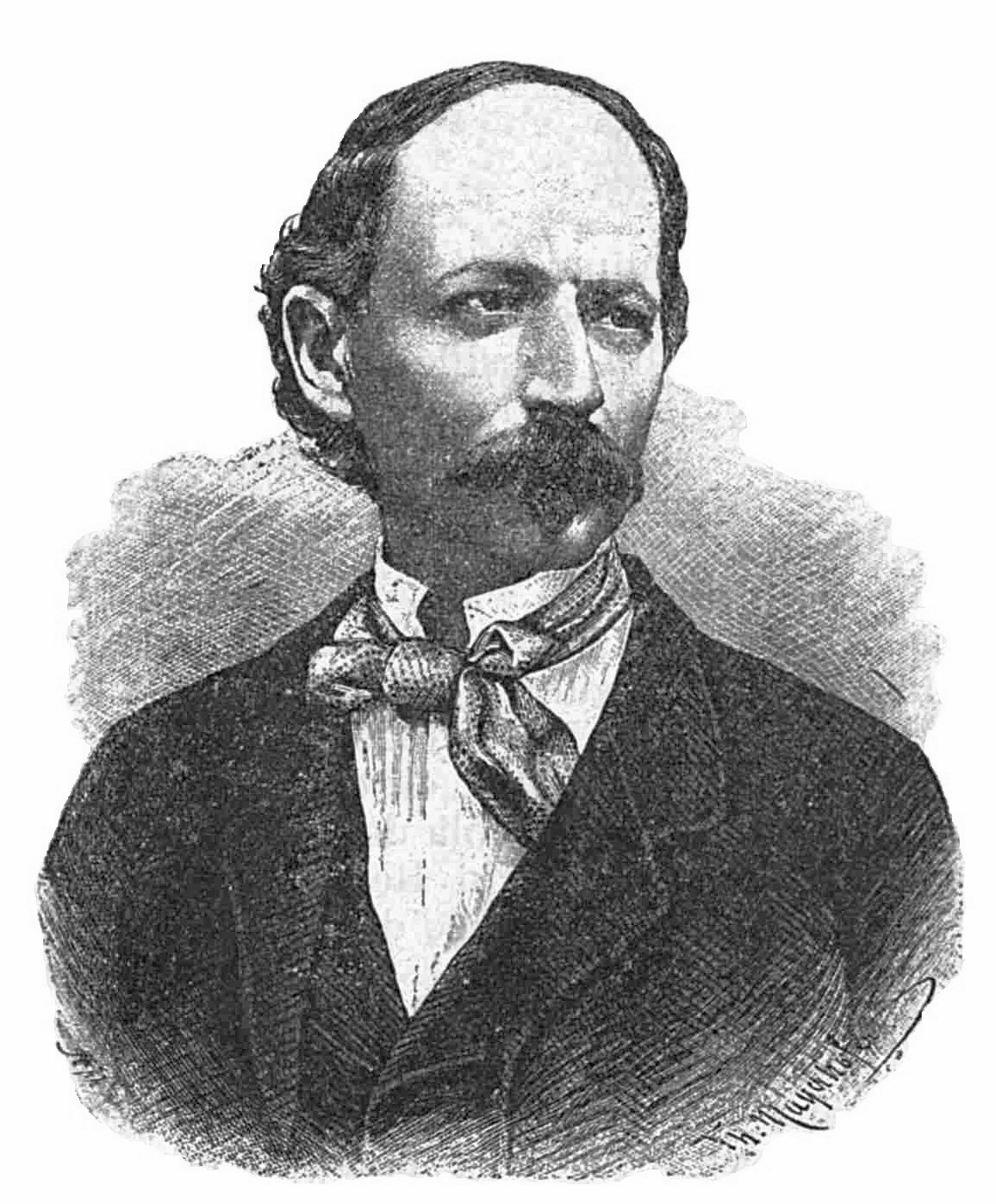|
Pantazi Ghica
Pantazi Ghica (; also known under the pen names Tapazin, G. Pantazi, and Ghaki; 15 March 1831 – 17 July 1882) was a Wallachian, later Romanian politician and lawyer, also known as a dramatist, poet, short story writer, and literary critic. A prominent representative of the liberal current, he was the younger brother and lifelong collaborator of Ion Ghica, who served as Prime Minister of the Romanian Kingdom in 1866-1867 and again in 1870-1871. Pantazi Ghica began his political career as a participant in the Wallachian Revolution of 1848, a collaborator of the Romantic historian and activist Nicolae Bălcescu, and a member of the radical grouping headed by C. A. Rosetti. Although twice involved in the administration of Buzău County, Ghica lived much of his life in exile or in Bucharest, and was also a soldier for the Ottoman Empire during the Crimean War. After 1875, he was a prominent member of the National Liberal Party. Generally seen as a mediocre writer, he was foremost ... [...More Info...] [...Related Items...] OR: [Wikipedia] [Google] [Baidu] |
:Template:Infobox Writer/doc
Infobox writer may be used to summarize information about a person who is a writer/author (includes screenwriters). If the writer-specific fields here are not needed, consider using the more general ; other infoboxes there can be found in :People and person infobox templates. This template may also be used as a module (or sub-template) of ; see WikiProject Infoboxes/embed for guidance on such usage. Syntax The infobox may be added by pasting the template as shown below into an article. All fields are optional. Any unused parameter names can be left blank or omitted. Parameters Please remove any parameters from an article's infobox that are unlikely to be used. All parameters are optional. Unless otherwise specified, if a parameter has multiple values, they should be comma-separated using the template: : which produces: : , language= If any of the individual values contain commas already, add to use semi-colons as separators: : which produces: : , ps ... [...More Info...] [...Related Items...] OR: [Wikipedia] [Google] [Baidu] |
Nicolae Bălcescu
Nicolae Bălcescu () (29 June 181929 November 1852) was a Romanian Wallachian soldier, historian, journalist, and leader of the 1848 Wallachian Revolution. Early life Born in Bucharest to a family of low-ranking nobility, he used his mother's maiden name, in place of his father's name, ''Petrescu'' (his mother was originally from Bălcești, Vâlcea County now, then Argeș County). His siblings were Costache, Barbu, Sevasta and Marghioala, and his father died in 1824. As a boy, Bălcescu studied at the Saint Sava College (from 1832), and was a passionate student of history. At the age of 17, he joined the Wallachian Army, and, in 1840, took part, alongside Eftimie Murgu and Cezar Bolliac, in Mitică Filipescu's conspiracy against Prince Alexandru II Ghica. The plot was uncovered, and Bălcescu was imprisoned in Mărgineni Monastery, where he remained for the following two years. The rough imprisonment conditions led to Bălcescu contracting tuberculosis, which left irrevers ... [...More Info...] [...Related Items...] OR: [Wikipedia] [Google] [Baidu] |
Titu Maiorescu
Titu Liviu Maiorescu (; 15 February 1840 – 18 June 1917) was a Romanian literary critic and politician, founder of the ''Junimea'' Society. As a literary critic, he was instrumental in the development of Romanian culture in the second half of the 19th century. A member of the Conservative Party, he was Foreign Minister between 1910 and 1914 and Prime Minister of Romania from 1912 to 1913. He represented Romania at the Peace Conference in Bucharest that ended the Second Balkan War. In politics as in culture he favoured Germany over France. He opposed Romania's entry in World War I against Germany, but he nevertheless refused to collaborate with the German army after it had occupied Bucharest. Biography Titu Liviu Maiorescu was born in Craiova, on 15 February 1840. Maiorescu's mother, born Maria Popazu, was the sister of the scholar and bishop of Caransebeș, Ioan Popazu. The family Popazu came from Vălenii de Munte. His father, Ioan Maiorescu, was the son of a Transylvania ... [...More Info...] [...Related Items...] OR: [Wikipedia] [Google] [Baidu] |
Junimea
''Junimea'' was a Romanian literary society founded in Iași in 1863, through the initiative of several foreign-educated personalities led by Titu Maiorescu, Petre P. Carp, Vasile Pogor, Theodor Rosetti and Iacob Negruzzi. The foremost personality and mentor of the society was Maiorescu, who, through the means of scientific papers and essays, helped establish the basis of the modern Romanian culture. Junimea was the most influential intellectual and political association from Romania in the 19th century. Beginnings In 1863, four years after the union of Moldavia and Wallachia (''see: United Principalities''), and after the moving of the capital to Bucharest, five enthusiastic young people who had just returned from their studies abroad created in Iaşi a society which wanted to stimulate the cultural life in the city. They chose the name "''Junimea''", a slightly antiquated Romanian word for "Youth". It is notable that four of the founders were part of the Romanian elite, the ... [...More Info...] [...Related Items...] OR: [Wikipedia] [Google] [Baidu] |
Conservatism
Conservatism is a cultural, social, and political philosophy that seeks to promote and to preserve traditional institutions, practices, and values. The central tenets of conservatism may vary in relation to the culture and civilization in which it appears. In Western culture, conservatives seek to preserve a range of institutions such as organized religion, parliamentary government, and property rights. Conservatives tend to favor institutions and practices that guarantee stability and evolved gradually. Adherents of conservatism often oppose modernism and seek a return to traditional values, though different groups of conservatives may choose different traditional values to preserve. The first established use of the term in a political context originated in 1818 with François-René de Chateaubriand during the period of Bourbon Restoration that sought to roll back the policies of the French Revolution. Historically associated with right-wing politics, the term ha ... [...More Info...] [...Related Items...] OR: [Wikipedia] [Google] [Baidu] |
Alexandru Macedonski
Alexandru Macedonski (; also rendered as Al. A. Macedonski, Macedonschi or Macedonsky; 14 March 1854 – 24 November 1920) was a Romanian poet, novelist, dramatist and literary critic, known especially for having promoted French Symbolism in his native country, and for leading the Romanian Symbolist movement during its early decades. A forerunner of local modernist literature, he is the first local author to have used free verse, and claimed by some to have been the first in modern European literature. Within the framework of Romanian literature, Macedonski is seen by critics as second only to national poet Mihai Eminescu; as leader of a cosmopolitan and aestheticist trend formed around his ''Literatorul'' journal, he was diametrically opposed to the inward-looking traditionalism of Eminescu and his school. Debuting as a Neoromantic in the Wallachian tradition, Macedonski went through the Realist- Naturalist stage deemed "social poetry", while progressively adapting his styl ... [...More Info...] [...Related Items...] OR: [Wikipedia] [Google] [Baidu] |
Alexandru Odobescu
Alexandru Ioan Odobescu (; 23 June 1834 – 10 November 1895) was a Romanian author, archaeologist and politician. Biography He was born in Bucharest, the second child of General Ioan Odobescu and his wife Ecaterina. After attending Saint Sava College and, from 1850, a Paris ''lycée'', he took the ''baccalauréat'' in 1853 and studied literature and archaeology at the University of Paris, graduating two years later. In 1858, he married Pavel Kiselyov's daughter Alexandra (Saşa) Prejbeanu; they had one daughter, Ioana. He was often apart from his wife and had affairs with other women. Odobescu served as cabinet minister for religion and education in 1863, as head clerk at the Ministry of Foreign Affairs in 1865, and as prosecutor at the Court of Appeal. In 1870, he travelled in Switzerland and Italy, in connection with his discovery and description of the Pietroasele treasure, a collection of objects made from precious metals, of Gothic origin, found on Romanian territory; he ... [...More Info...] [...Related Items...] OR: [Wikipedia] [Google] [Baidu] |
Dimitrie Bolintineanu
Dimitrie Bolintineanu (; 14 January 1819 (1825 according to some sources), Bolintin-Vale – 20 August 1872, Bucharest) was a Romanian poet, though he wrote in many other styles as well, diplomat, politician, and a participant in the revolution of 1848. He was of Aromanian origins. His poems of nationalist overtone fueled emotions during the unification of Wallachia and Moldavia. Biography Dimitrie Bolintineanu was of Aromanians origin, his father, Ienache Cosmad, came from Ohrid. In a few years his father, Ienache, made a successful carrier in Wallachia, first he was a tenant, small owner, then sub-prefect, with the residence in Bolintin-Vale, village near Bucharest; he does not manage to leave to his second-born son, Dimitrie, some property for relieve. He remained orphan of both parents since 1831, and was raised by the relatives. He started to earn for leaving since yearly youth, such as Grigore Alexandrescu, Ion Luca Caragiale, Mihai Eminescu, being a civil servants. I ... [...More Info...] [...Related Items...] OR: [Wikipedia] [Google] [Baidu] |
Vasile Alecsandri
Vasile Alecsandri (; 21 July 182122 August 1890) was a Romanian patriot, poet, dramatist, politician and diplomat. He was one of the key figures during the 1848 revolutions in Moldavia and Wallachia. He fought for the unification of the Romanian Principalities, writing "Hora Unirii" in 1856 and giving up his candidacy for the title of prince of Moldavia, in favor of Alexandru Ioan Cuza. He became the first minister of foreign affairs of Romania and was one of the founding members of the Romanian Academy. Alecsandri was a prolific writer, contributing to Romanian literature with poetry, prose, several plays, and collections of Romanian folklore, being considered, alongside Mihai Eminescu, which admired and was inspired by the writings of Alecsandri, as one of the most important Romanian writers in the second half of the 19th century. Early life Origins and childhood Alecsandri was born in the Moldavian town of Bacău and he was of Greek origin. His parents were Vasile Alecsandri ... [...More Info...] [...Related Items...] OR: [Wikipedia] [Google] [Baidu] |
Nicolae Filimon
Nicolae Filimon (; 6 September 1819 – 19 March 1865) was a Wallachian Romanian novelist and short-story writer, remembered as the author of the first Realist novel in Romanian literature, ''Ciocoii vechi şi noi'' ("The Old and the New Parvenus"), which was centered on the self-seeking figure Dinu Păturică (who drew comparisons with Stendhal's Julien Sorel). He was also a noted travel writer, folklorist, musician, and the first musical critic in his country. Biography Born in Bucharest as the son of an Eastern Orthodox parish priest of the Enei Church, Filimon was a cantor and an autodidact. According to Ion Ghica's ''Letters'', he was briefly employed by theater companies after his father's death in 1830, singing in a theater choir and playing the flute. In 1852, he was chosen administrator of the Enei Church, remaining in office until his death. The same year, he became a minor public official at the Faith Department in Prince Barbu Dimitrie Ştirbei's Chancellery. In la ... [...More Info...] [...Related Items...] OR: [Wikipedia] [Google] [Baidu] |
National Liberal Party (Romania, 1875)
The National Liberal Party ( ro, Partidul Național Liberal, PNL) was the first organised political party in Romania, a major force in the country's politics from its foundation in 1875 to World War II. Established in order to represent the interests of the nascent local bourgeoisie, until World War I it contested power with the Conservative Party, supported primarily by wealthy landowners, effectively creating a two-party system in a political system which severely limited the representation of the peasant majority through census suffrage. Unlike its major opponent, the PNL managed to preserve its prominence after the implementation of universal male suffrage, playing an important role in shaping the institutional framework of ''Greater Romania'' during the 1920s. History Dominated throughout its existence by the Brătianu family, the party was periodically affected by strong factionalism. Among the many splits during the party's early history a notable one was that led ... [...More Info...] [...Related Items...] OR: [Wikipedia] [Google] [Baidu] |
Crimean War
The Crimean War, , was fought from October 1853 to February 1856 between Russia and an ultimately victorious alliance of the Ottoman Empire, France, the United Kingdom and Piedmont-Sardinia. Geopolitical causes of the war included the decline of the Ottoman Empire, the expansion of the Russian Empire in the preceding Russo-Turkish Wars, and the British and French preference to preserve the Ottoman Empire to maintain the balance of power in the Concert of Europe. The flashpoint was a disagreement over the rights of Christian minorities in Palestine, then part of the Ottoman Empire, with the French promoting the rights of Roman Catholics, and Russia promoting those of the Eastern Orthodox Church. The churches worked out their differences with the Ottomans and came to an agreement, but both the French Emperor Napoleon III and the Russian Tsar Nicholas I refused to back down. Nicholas issued an ultimatum that demanded the Orthodox subjects of the Ottoman Empire be placed ... [...More Info...] [...Related Items...] OR: [Wikipedia] [Google] [Baidu] |








